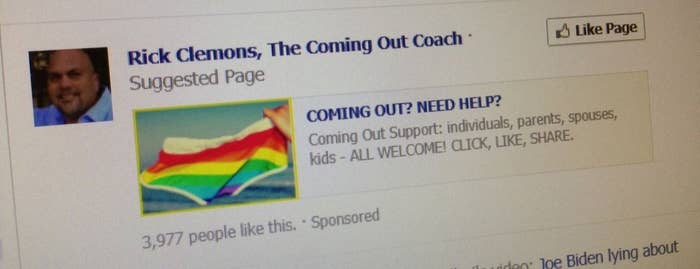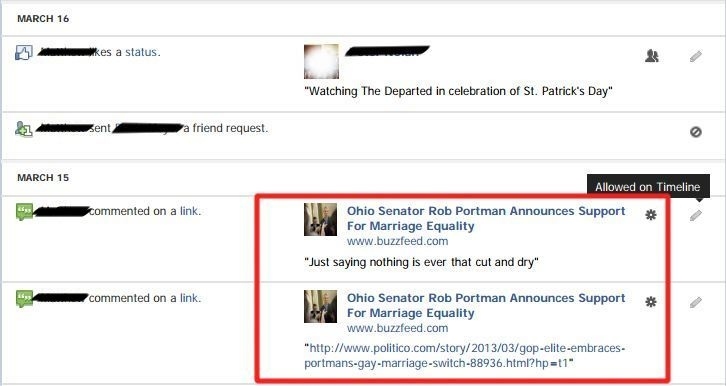
When Matt (last name withheld for privacy) logged onto Facebook earlier this week, he was startled by the placement of a seemingly impossible ad on his News Feed: a rainbow-underwear-adorned banner for Rick Clemons (the California-based, self-appointed "Coming Out Coach") that read, "COMING OUT? NEED HELP?"
Matt (who lives on the East Coast) did need help coming out. But as far as he knew, there was only one other person in the world who knew that but him.
Matt told BuzzFeed FWD in an email:
As many LGBT individuals know, for a time, the most closely held secret we have is our sexuality. Several nights ago, I texted a close and dear friend for advice on revealing such sensitive personal information. The next morning, I woke up to a "sponsored story" on my Facebook page that asked "Coming Out? Need help?" How did Facebook know such a specific ad would apply to my profile?
He had texted a close friend the night before, asking him for advice about how to come out as gay to his parents. The next day he saw the ad and, because he didn't remember volunteering any information about his sexual orientation to Facebook, he wondered if his iPhone's Facebook app were somehow tracking his text messages.
It wouldn't be the first time Facebook users have expressed expressed concern that their texts were being read by Facebook, though Facebook has consistently maintained they do not (and would not) do so. A Facebook spokesperson who got in touch with BuzzFeed FWD for this story also denied that Facebook is accessing users' texts, saying that to do so would be an invasion of privacy. (Indeed, from a technological standpoint, it seems unlikely the Facebook app for iPhone would work in that capacity.)
And yet, to Matt, it seemed like there was no other way they could know. Matt didn't like any pages associated with LGBTQ issues — just a Republican politician and a local bar, he says — and definitely wasn't talking about his sexual orientation either in plain view (his wall or others) or in semi-privacy (personal messages or chat). So he took a look back through his activity log in search of "clues" — anything that might've let Facebook know this ad was personally relevant.
All he could find was a comment on a friend's linked BuzzFeed story — "Ohio Senator Rob Portman Announces Support For Marriage Equality."

Here's a more likely scenario: Though he didn't realize it at the time — as most casual users of Facebook certainly wouldn't — Matt revealed something about himself to Facebook when he commented on that post. (Ad buyers can target ads according to all sorts of criteria: location, age, birthday, interests, etc. It's impossible to say for sure why Matt was shown this particular ad, but it certainly could have been something like this.) It wasn't the full story — the surprising timeliness and specificity of the ad was, in all likelihood, a coincidence — but enough that Facebook ad buyers could make an inference about his sexual orientation, and target ads to that effect.
This, of course, is standard practice for many giant corporations; it's the same type of consumer behavioral tracking and data mining that allowed Target to guess that one teenage girl was pregnant, inadvertently alerting her parents to their daughter's pregnancy by mailing coupons for maternity clothing and cribs to their house. It's normal, in that weird way where saying the same thing — "Facebook knows I'm gay," or "Target thinks I'm pregnant and due in August" — can sound like either total paranoia or smart business, depending on how you say it.
But the intent here — who, exactly, it was who thought this ad and Matt were a good match, and why — might not be so important (or as telling) as the perception of users like him and, well, the rest of us. As Matt puts it, "It certainly felt like a violation of trust that someone obtained that information."
